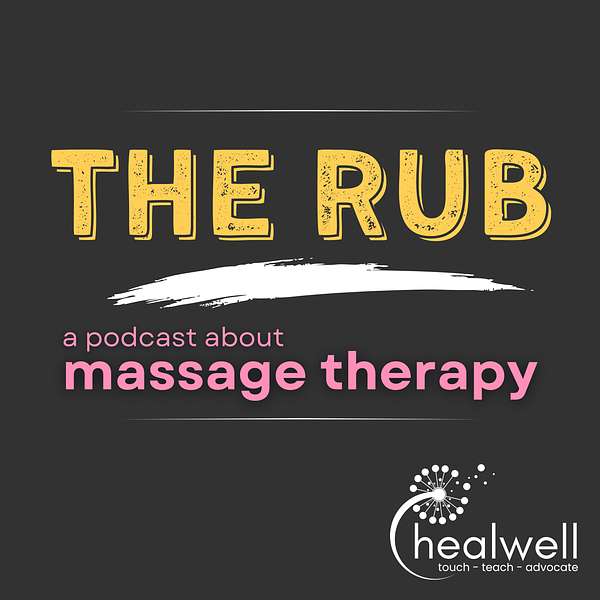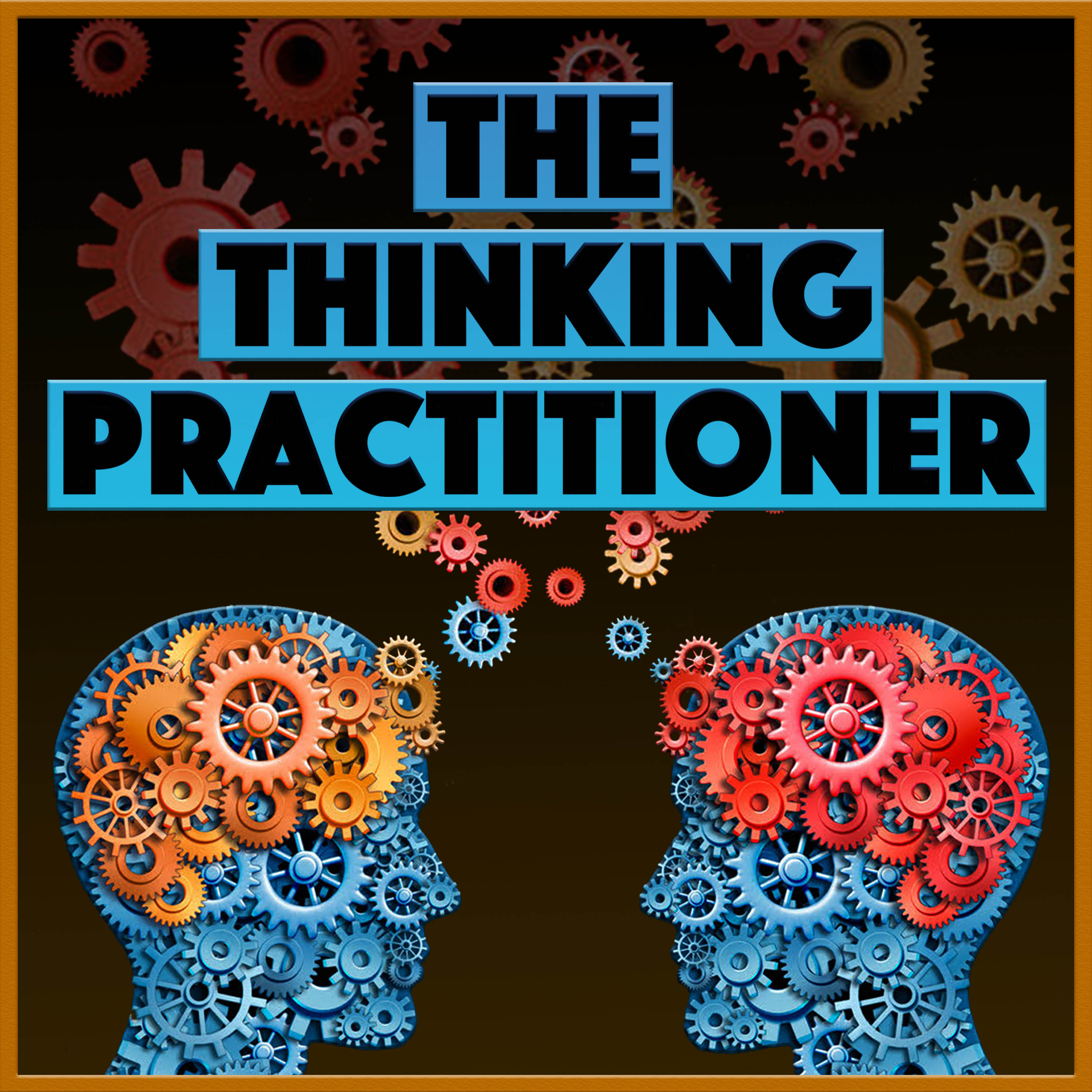
The Rub: a podcast about massage therapy
Join Healwell in examining and bringing context to the world of massage therapy beyond the table. We have ideas. We have opinions. We want change, and that will only come with an understanding of who and what massage therapy truly is. A variety of topics are up for grabs: history, philosophy, development, and all the other shiny things that fascinate us.
Healwell is a non-profit based out of the Washington DC area. Check us out at www.healwell.org
The Rub: a podcast about massage therapy
Rubdown News Alert: California State Licensing
Read our blog post for more in-depth information on why CAMTC should be sunsetted.
California is one of only five states without massage therapy licensing, operating instead under a questionable "voluntary certification" system run by the California Massage Therapy Council (CAMTC). This system requires minimal education, no continuing education, and no examination, while creating barriers for therapist mobility and failing to protect the public.
• CAMTC is a private, non-profit corporation that has been criticized for lack of transparency and accountability
• The CEO of CAMTC earns over half a million dollars while the organization collects $8 million in fees
• CAMTC has arbitrarily denied certificates to qualified students and operates without due process requirements
• Professional organizations including AMTA and ABMP support sunsetting CAMTC
• A hearing on April 29th could determine whether CAMTC will be dissolved
Show notes:
----> ABMP Template for Writing a Letter to California Legislators <----
ABMP Statement on California Licensing
AMTA Statement on California Licensing
FSMTB Model Massage Therapy Practice Act
Special thanks to Laura Allen for fact-checking this episode. Read her blogs about CAMTC here.
CAMTC Sunset Hearing Background Report
Send us an email: podcast@healwell.org
Leave us a voice message: 703-468-1799
Check out our interview-style podcast: Interdisciplinary
You can support Healwell and the cool things we make by donating here!
Ways join in:
- Leave us a review on Apple Podcasts
- Subscribe to our Substack: "More Than Hands"
- Check Healwell’s live and online classes
- Continue the conversation with a free 3-day trial of the Healwell Community
- Find a copy of Rebecca Sturgeon's book: "Oncology Massage: An Integrative Approach to Cancer Care"
Thank you to ABMP and AMTA for sponsoring us!
Healwell is a 501(c)(3) non-profit based out of the Washington DC area. Check us out at www.healwell.org
Welcome to our first rubdown news alert on this podcast about massage therapy. I'm your host, kori Rivera, licensed massage therapist and correspondent, and today we're talking about a time sensitive event, that's. And then there's California. There's a push happening right now. So if you're a massage therapist in California that supports state licensing, please scroll to the link in the show notes for directions on how to write your legislators before April 29th. That said, here's the abridged story of what's Up with California.
Speaker 1:California, along with Minnesota, kansas, vermont and Wyoming, is one of only five states left that does not have state licensing for massage therapists. California, however, is unique because it has a voluntary certification process. You can earn this completely voluntary, not required in any way certification, by completing 500 hours of education and shelling out 300 bucks. There's no exam. There are no requirements for recertification, which means there is no continuing education required, but there is a $300 recertification fee every two years. You may ask how did this happen? Until 2008, massage in California was not regulated on a state level. Individual towns and cities could regulate or not regulate massage therapy however they wanted to. Generally, massage therapy was regulated as adult entertainment, which could mean requiring massage therapists to register as sex workers and to show a clean sexually transmitted infection test before being granted a city license. Obviously, this is not ideal. In 2008, a bill was passed creating the California Massage Therapy Council, or CAMTC.
Speaker 1:Camtc is a private, non-profit public benefit corporation. The charge of the California Massage Therapy Council was, and I'm quoting here A Create and implement a voluntary certification program for the massage therapy profession that will enable consumers to easily identify credible, certified massage therapists or CMTs. B ensure that certified massage professionals have completed sufficient training at approved schools. And. C approve massage schools. By the way, a school must be CAMTC approved in order for their graduates to qualify for a certificate. So CAMTC is a private, non-profit public benefit corporation. Let's break that down because it's a lot. The non-governmental part means that they work with the government but not for it. They can be partially funded by government grants. The non-profit part means they are tax exempt. They can also fundraise and accept donations from the public. The private part means they can have shareholders, but because of the public benefit piece, they have to take into account more interest than just their shareholders. A public benefit corporation, also known as a B Corp, might, for example, support farmworker rights and sustainable farming, because workers deserve rights and climate change is real. In order to increase transparency, all non-profit organizations have to file a tax document called a 990, which is publicly available and in the show notes. In CAMTC's 990, they state protecting the public as their purpose.
Speaker 1:Camtc began issuing voluntary certifications in 2009. There are some questionable things happening at CAMTC right now. They have denied certificates to several hundred students who have met the requirements because of a dispute with the school the students attended. The Superior Court of California stated that the certificates needed to be awarded by April 4th and as of today, april 22nd, this has not happened. Also, if you look at CAMTC's filings, you can see that in 2003, the CEO made over half a million dollars in salary and the company itself made $8 million in application fees. No-transcript are part of the public.
Speaker 1:There is a hearing on April 29th to allow CAMTC to be sunsetted. A sunset provision is when a law or other regulation will expire on a set date unless the legislature chooses to renew it. Sunsetting helps legislators regularly review laws to ensure that they are functioning properly. Allowing CAMTC to sunset would dissolve it. We think that should happen. So does AMTA and ABMP. You can read each of their statements at the link in the show notes. Camtc's sunset has been renewed multiple times since 2014, and always under the condition that specific changes are made. This is normal. However, the next sunset review was scheduled for 2026, but was moved up a year due to a substantial fee increase, transparency and accountability issues and a concern that CAMTC's board of directors was rubber stamping the decisions of the staff instead of providing oversight, which is the purpose of a board of directors.
Speaker 1:Licensing is not just for the public good. It is good for the profession. As we talked about earlier, camtc's certification is completely voluntary, meaning anyone, with or without an education, can call themselves a massage therapist. How does that help the public? The voluntary certification requires 500 hours of education, which if you've ever listened to this podcast, you know we think isn't enough, and we're not the only ones. And again, voluntary certification requires no continuing education, which has the immediate issue of people thinking 500 hours is enough education for an entire career. And then there are other, more day-to-day consequences. I've spoken with people trying to hire massage therapists in California and it's impossible to figure out what kind of education people have. One person I spoke to said most of the resumes they read had no post-foundational education at all and that was for a position at a hospital. Other people have expressed how embarrassing it is to speak with their healthcare co-workers and explain that certified massage therapist means nothing at all and is also the only state credential they have access to. Massage therapist means nothing at all and is also the only state credential they have access to, and if healthcare providers don't know that, clearly the public has no idea, which means CAMTC is failing in its primary stated goal public safety.
Speaker 1:California, like many states, is currently battling against a large number of human trafficking groups using illicit massage businesses as cover for their activities. Camtc claims that state licensing will make it harder to police human trafficking, but that doesn't hold water, because having a required state license will make it easier for law enforcement to identify massage therapists and it would create a statewide database for tracking license violations. As it stands, camtc is not bound by due process, which means they can arbitrarily suspend or revoke a certification as they see fit. This is, frankly, an insane amount of power for one body to have over therapists, schools and businesses. On the same note, c-amtc can operate in secrecy, while a state board could not. C-amtc's defense is that they can move faster than a state board could, which is true, but it also means they can move fast to wield their power.
Speaker 1:The voluntariness of the certification has also caused problems in municipalities. Your city might not require a certification because you are a sole practitioner, but the city down the road might. This means that massage therapists in California have to navigate a huge variety of different regulations and requirements in order to work in multiple municipalities. The variety extends to the fees massage therapists are required to pay. In some municipalities it's $50, and in others it's $800. If you think trying to move between cities in California is bad, try moving out of the state.
Speaker 1:Most state licenses have a provision allowing massage therapists licensed in another state to automatically qualify for a license in theirs, which decreases paperwork and confusion. But because California's voluntary certification has low education hours and no exam requirement, most Californian massage therapists can't get a license in another state without passing an exam and taking additional education, which can mean taking an entire program. Basically, being a certified massage therapist gets you absolutely nowhere, but it will lighten your pocket by $300 every two years. It's worth noting that 45 states and two US territories have figured out state licensing. Camtc makes a lot of noise about administrative burden and cost to massage therapists, but this isn't actually difficult. There are 47 other pieces of legislation that California could use as a blueprint for licensing, and writing these kinds of rules is old hat for AMTA and ABMP and FSMTB wrote a 42-page guide called the Model Massage Therapy Practice Act.
Speaker 1:The fact that not all states have licensing is a big mark against the profession for our participation in programs like Medicare and Medicaid. When we try to speak to those programs, they take one look at our proverbial house and say we need to get ourselves in order before we can work with them. So if you're in California, please send a letter to the Business and Professionals Committee today using the link in the show notes helpfully provided to us by ABMP. If you're not in California, please write to AMTA and ABMP and tell them that you support them in supporting California licensing. It is good practice to encourage people who represent you when they do something you approve of. The massage therapists, business schools and generally the people of california deserve better than voluntary certification, which is essentially an expensive participation trophy with cheap guilt covered in dust.
Speaker 1:This has been your rubdown news alert. Thank you for listening. If you found this news update helpful, consider donating. Donating to HealWell at healwellorg slash donate or click the link in the show notes. This podcast works hard to bring you timely news and underexplored issues in the massage therapy profession. Even small donations make a big difference. We're starting the conversations that matter to you and your work, and we need your help to keep doing it. Once again, thank you for listening.
Podcasts we love
Check out these other fine podcasts recommended by us, not an algorithm.

Interdisciplinary
Healwell
Maintenance Phase
Aubrey Gordon & Michael Hobbes
You're Wrong About
Sarah Marshall
The Rest Room
Natasha Lipman
The ABMP Podcast | Speaking With the Massage & Bodywork Profession
Associated Bodywork & Massage Professionals
Research Perch
Massage Therapy Foundation
Unexplainable
Vox
The Words Matter Podcast with Oliver Thomson
Oliver Thomson
The Thinking Practitioner
Til Luchau & Whitney Lowe
Collaborative Connections Podcast | Conversations on Cancer Care for Oncology Massage Therapists & Estheticians
Society for Oncology Massage & Esthetics

